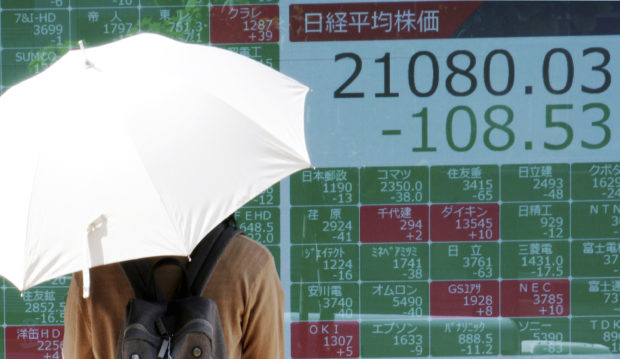Global stocks mixed after Trump signs telecoms order
TOKYO – Global shares are mixed after President Donald Trump signed an order imposing controls on exports to foreign telecoms companies that apparently was aimed at Chinese equipment makers.
France’s CAC 40 slipped nearly 0.2% to 5,364.35 in early trading, while Germany’s DAX fell 0.5% to 12,043.09. Britain’s FTSE 100 lost 0.1% to 7,289.29.

U.S. shares were set to be little changed, with the future contract for the Dow Jones Industrial Average basically unchanged at 25,675. S&P 500 futures gained less than 0.1% to 2,855.70.
In Asia, Japan’s benchmark Nikkei 225 slipped 0.6% to finish at 21,062.98.
South Korea’s Kospi dipped 1.2% at 2,067.69.
Australia’s S&P/ASX 200 gained 0.7% to 6,327.80.
Hong Kong’s Hang Seng was little changed, inching up less than 0.1% to 28,275.07, while the Shanghai Composite added 0.6% to 2,955.71.
Stocks have been whipsawed this week by worries over the worsening relationship between China and the U.S. and its impact on the broader global economy.
On Thursday, China protested the Trump administration decision to issue an executive order apparently aimed at banning equipment sold by telecoms gear maker Huawei from U.S. networks. It also subjected the Chinese company to strict export controls.
Huawei, the biggest global maker of switching equipment for phone and internet companies, has spent a decade fighting accusations it facilitates Chinese spying.
A Chinese foreign ministry spokesman, Lu Kang, criticized “abuse of export control measures” after Trump signed an order requiring vendors to get approval for sales to Huawei.
Comments by U.S. Treasury Secretary Steven Mnuchin on Wednesday offered some reassurance, as Mnuchin said he and U.S. Trade Representative Robert Lighthizer were planning to travel to Beijing for more trade talks.
Details of such talks have not been announced by the Chinese side.
But that plus news that Trump might delay the imposition of tariffs on auto imports by six months helped lift market sentiment.
Markets have swung widely in recent weeks as trade tensions between the world’s two biggest economies intensified.
The Trump administration more than doubled tariffs on $200 billion in Chinese imports and spelled out plans to target the $300 billion worth that aren’t already facing 25% taxes.
The escalation covers everything from sneakers to toasters to billiard balls. The Chinese have retaliated by hiking tariffs on $60 billion in U.S. imports.
ENERGY: Benchmark U.S. crude gained 38 cents to $62.40 a barrel in electronic trading on the New York Mercantile Exchange. It rose 0.4% to $62.02 per barrel Wednesday. Brent crude, the international standard, added 30 cents to $72.07 per barrel.
CURRENCIES: The dollar rose to 109.65 Japanese yen from 109.59 yen. The euro inched up to $1.1209 from $1.1206. /gg